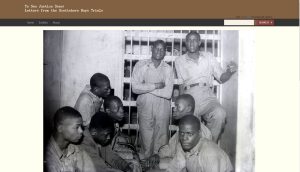
From the November 2016 Desktop News | Margaret Sasser, a 2014 alumna, spent one summer during her Master’s program digging through archives at the Alabama Department of Archives and History in Montgomery, Alabama. She had been hired by Dr. Ellen Spears, an associate professor in New College and the Department of American Studies, to sort through roughly 17 boxes of letters, postcards, telegrams, petitions, and resolutions sent to Alabama Governor Benjamin Meeks Miller regarding the 1930s Scottsboro Trials—and last month her work became the basis for a new online database launched by the Alabama Digital Humanities Center.
The website, called “‘To See Justice Done’: Letters from the Scottsboro Trials,” contains a digitized sampling of the thousands of materials Sasser found and specifically highlights how many citizens were concerned with social justice at the time—writing to authorities to demand freedom for the nine young African Americans who were falsely accused of rape and sentenced to death in Scottsboro.
“The collection included correspondence from dozens of other countries and from almost every continent,” Sasser said. “I discovered one telegram that was signed by Albert Einstein and Thomas Mann. Another petition sent by Nancy Cunard, of the Cunard shipping line, included signatures from Salvador Dali, Ezra Pound, and Sinclair Lewis.
“The exhibit shows how labor concerns united people across racial divides. It debunks stereotypes that bias only occurs in certain regions of the country, and it illustrates the American tradition of protesting to create change in our communities.”
Though the project is certainly not Sasser’s alone, being a part of a larger six-year collaboration between UA and the Scottsboro Boys Museum and Cultural Center, Spears says that the project has provided a way for University of Alabama students to make history.
“These resources have not previously been available online,” Spears said. “And they provide an extraordinary primary resource for students and scholars of African American history and social justice. We hope that this project will lead to more in-depth work in the collection in Montgomery and greater understanding of the long struggle for racial justice in the United States.”
In addition to the efforts of collaborators listed above, the project received support from Alabama Digital Humanities Center, the Alabama Department of Archives and History, the Center for Community-Based Partnerships, the Summersell Center for the Study of the South, the Center for Ethics and Social Responsibility, New College, and the departments of American studies and history.
To see and search the database, visit scottsboroboysletters.as.ua.edu.